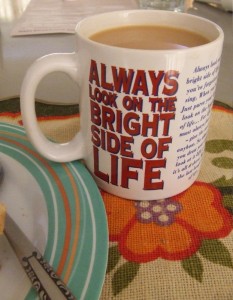Imagine this situation: a “caring”and friendly neighbour noticed that you’ve been looking rather sad lately, and asks you, ‘You’ve been looking gloomy lately … Are you OK?’ You tell them that your mum is dying of a rather rare but highly malignant form of cancer on the other side of the world. After explaining the situation to your neighbour in a short two-minutes-and-a-half conversation (because of course you don’t want to burden them with your grief) imagine all they say to you is ‘Look at the bright side of life’?

Commons Attribution 2.0. Full terms at http://creativecommons.org/licenses/by/2.0
Baffling, eh?
This isn’t fiction. It happened to one of my friends. Her mum is dying of a type of cancer that has no known cure, a carcinosarcoma. Look it up if you’re into finding out the facts about diseases. When I did, I was profoundly shocked. The same profound shock I also experienced when my friend told me about the chat with her neighbour. The first thought that came to my head was that such a comment is “New Ageism” or “Polyanna-ism” gone mad. Is there a “bright” side to profound grief and helplessness? More importantly, is it necessary to “say” anything at all?
Many years ago I was very teary after one of my very many relationship disasters and happened to be visiting a friend of mine in Buenos Aires for “coffee and compassion”. Her then 5-year-old daughter was playing with a friend in the next room and stormed into the lounge area where my friend and I were having coffee. The little girl stared at me in bewilderment and asked, ‘¿Qué te pasa?’ (What’s the matter with you?). I could just utter words to say that I wasn’t having a very good day, but my friend stepped in to manage the situation. What she said and did will stay with me forever.
‘You know, FF is sad. People cry when they’re sad. Many times they look sad in different ways. They’ve got a sad look on their faces. They aren’t their usual happy selves. When that’s the case, you give them a hug and tell them that you care for them.’ As she said that, my friend hugged me. I still feel her hug, but what’s more important is that she’s passed on a lesson in wisdom to me.
Words can’t transmit what a hug can. In many cases, a hug may not be the right thing to do in certain cultural settings, but a compassionate look and a few words can work in the same way.
- I feel for you.
- I’m so sorry to hear you’re going through this.
- Take good care of yourself.
Nothing too sophisticated really.
A rabbi whose name I can’t remember said that people who are experiencing grief don’t really expect our words of consolation. They expect our acknowledgement of what they’re going through. Sympathy isn’t about giving a speech or offering bullshit platitudes.
When I mentioned this situation to another good friend of mine, she said that Anglo people struggle to express their feelings and if someone is candid about their emotions, the typical Anglo person can’t take it in and will utter platitudes. Even if that were the case, the ‘look at the bright side’ comment that my grieving friend heard from her neighbour goes way beyond the realm of platitudes into something that appears heaps closer to callousness or stupidity.
It’s situations like these that start me thinking of all kinds of snappy answers:
- Thank you, I probably should start thinking of the inheritance. Is that what you mean by ‘bright side’?
- Sure, after mum is gone, I won’t have to visit my dad. He’s a nasty piece of work after all.
- We can throw a party instead of a funeral … Yeah!
- I can drink a toast to the deceased: I’ve always wanted to pour a drink for me and someone else and drink the two glasses. Lather, rinse, repeat, until I end up as drunk as a skunk.
I tend to be a very imaginative person, but that’s all I can think about in the Snappy Answer Dept. Maybe I’m having a very unimaginative day today. At least I’ve had a good day at work.
Or maybe encouraging a grieving person to look at the “bright side” of their (impending) loss just doesn’t wash by any standards.
